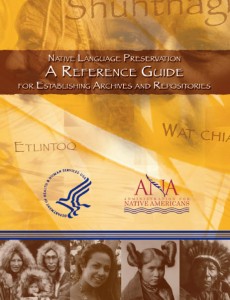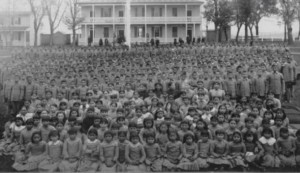During the MET 521 course there has been much discussion around the importance of preserving Native Languages, however very little specific information about how this is done on a practical level has been shared. This PDF guide is a practical reference guide that describes the specific steps and processes to preserve a language. Chapters include:
Chapter 1: Why Preserve Native Heritage Language Materials?
Chapter 2: What to Preserve: A Practical Approach to Preservation
Chapter 3: What Is a Language Repository?
Chapter 4: How to build infrastructure to Preserve Native Language Materials
Chapter 5: Where to Locate Resources in Selected Native Repositories and How to Find Selected Native Language Materials
Chapter 6: Where to Locate Resources in Selected Educational, Federal, and Other Repositories
Note: There are also 11 assorted appendices included.
http://www.aihec.org/resources/documents/NativeLanguagePreservationReferenceGuide.pdf

